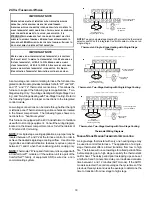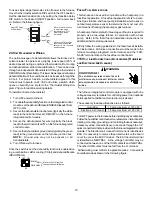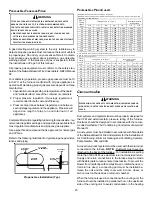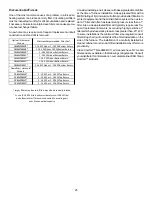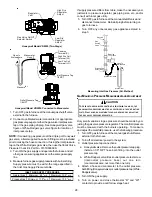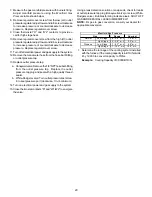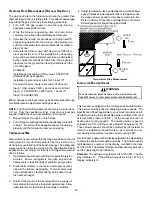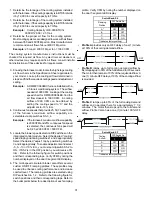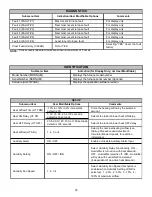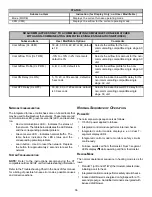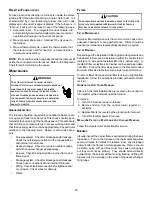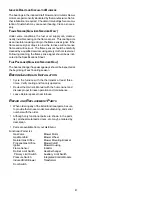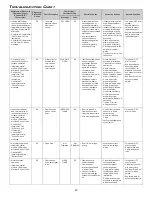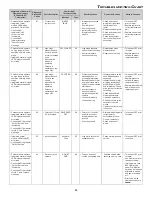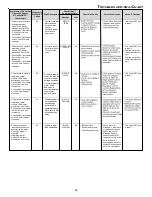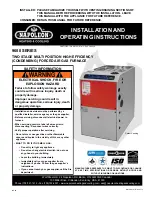
32
3
4
+5%*
OFF
OFF
-5%
ON
OFF
10%
OFF
ON
-10%
ON
ON
Switch Bank: S3
Adjust Taps
DIP Switch No.
(*Indicates factory setting)
NOTE: To enable adjustments and select -5, 5, -10 or 10%
trim, you must set dip switch S5-2 to ON. If S5-2 is in the
OFF position, you will receive 0% trim.
•
Profile D
ramps up to 50% of the demand for 1/2 minute,
then ramps to 85% of the full cooling demand airflow
and operates there for approximately 7 1/2 minutes. The
motor then steps up to the full demand airflow. Profile D
has a 1/2 minute at 50% airflow OFF delay.
OFF
OFF
7. Select the heating speed for your model from the heating
speed chart in the Specification Sheet. The adjust setting
(already established by the cooling speed selection)
determines which set of speeds are available. The
selected speed must provide a temperature rise within
the rise range listed with the particular model.
Example:
If the DM80VC0604BX is set for 1210 CFM
on cooling, the “ADJUST” is set to “+” (plus).
The four heating speeds available are “A
Plus”, “B Plus”, “C Plus”, and “D Plus”. “A
Plus” has a rise of 38
°
F for both stages
which is within the 20-50°F rise range for
the DM80VC0604BX. This setting will keep
electrical consumption to a minimum. Set
the “Heat” speed DIP switches to “A”.
3
4
A
OFF
OFF
B*
ON
OFF
C
OFF
ON
D
ON
ON
Switch Bank: S4
Heating
Airflow
DIP Switch No.
(*Indicates factory setting)
8. Select the desired “heating” speed tap by positioning
switches S4- 3, 4 appropriately. Refer to figure above.
Verify CFM by noting the number displayed on the dual
7-segment LED display.
In general lower heating speeds will: reduce electrical consump-
tion, lower operating sound levels of the blower, and increase
the outlet air temperature delivered to the home. The speeds
available allow the blower performance to be optimized for the
particular homeowner’s needs.
B
LOWER
H
EAT
O
FF
D
ELAY
T
IMINGS
The integrated control module provides a selectable heat off
delay function. The heat off delay period may be set to 90, 120,
150, 180 seconds using the DIP switches or jumper provided
on the control module. The delay is factory shipped at 150
seconds but may be changed to suit the installation require-
ments and/or homeowner preference. Refer to the following fig-
ures for switch positions and corresponding delay times.
1
2
90 s econds
OFF
OFF
120 s econds
ON
OFF
150 s ec onds *
OFF
ON
180 s econds
ON
ON
(*Indic ates f ac tory s etting)
Heat OFF Delay
DIP Sw itc h No.
Sw itch Bank : S1
Heat Off Delay Dipswitches
C
OMFORT
N
ET
™ S
YSTEM
O
VERVIEW
The ComfortNet system is a system that includes a ComfortNet
compatible furnace and air conditioner or heat pump with a
CTK0* thermostat. A valid ComfortNet system could also be a
compatible furnace, CTK0* thermostat and non-compatible,
single stage air conditioner. Any other system configurations
are considered invalid ComfortNet systems and must be con-
nected as a traditional (or legacy) system (
see Electrical Con-
nections
for wiring connections).
A ComfortNet heating/air conditioning system differs from a non-
communicating/traditional system in the manner in which the
indoor unit, outdoor unit and thermostat interact with one an-
other. In a traditional system, the thermostat sends commands
to the indoor and outdoor units via analog 24 VAC signals. It is
a one-way communication path in that the indoor and outdoor
units typically do not return information to the thermostat.
In a ComfortNet system, the indoor unit, outdoor unit, and ther-
mostat comprising a ComfortNet system “communicate” digi-
tally with one another. creating a two-way communications path.
The thermostat still sends commands to the indoor and out-
door units. However, the thermostat may also request and
receive information from both the indoor and outdoor units. This
information may be displayed on the CTK0* thermostat. The
indoor and outdoor units also interact with one another. The

